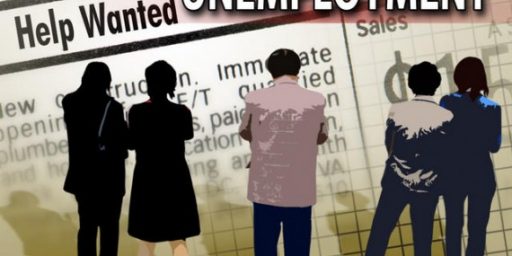August Jobs Report Reveals Zero Net Jobs Created For The First Time Since 1945
Another bad report from the Labor Department.
For the first time in 66 years, the monthly jobs report shows zero net jobs created in the month of August:
The US economy created no jobs and the unemployment rate held steadily higher at 9.1 percent in August, fueling concerns that the US is heading for another recession.
It was the first time since World War II that the economy had a net zero jobs created for a month.
Economists had been expecting the report to show a net of 75,000 jobs created, an unusually low number considering the US is technically more than two years removed from the end of the last crisis.
Markets had been closely watching the August report in hopes that the employment picture would begin to show signs of recovery.
(…)
Private payrolls actually created 17,000 jobs, but was offset by continued shrinkage in government.
Average hourly earnings slid cents to $23.09.
Among the more disturbing numbers: the amount of people “marginally attched to the labor force” rose to 2.6 million from 2.4 million. These are workers not included in the unemployment count because they had not sought work in the past four weeks but have looked in the past year.
The details about these “marginally attached” workers is fairly distressing:
About 2.6 million persons were marginally attached to the labor force in August, up from 2.4 million a year earlier. (The data are not seasonally adjusted.) These individuals were not in the labor force, wanted and were available for work, and had looked for a job sometime in the prior 12 months. They were not counted as unemployed because they had not searched for work in the 4 weeks preceding the survey. (See table A-16.)
Among the marginally attached, there were 977,000 discouraged workers in August, down by 133,000 from a year earlier. (The data are not seasonally adjusted.) Discouraged workers are persons not currently looking for work because they believe no jobs are available for them. The remaining 1.6 million persons marginally attached to the labor force in August had not searched for work in the 4 weeks preceding the survey for reasons such as school attendance or family responsibilities. (See table A-16.)
Further details from The New York Times.
Digging deeper into the report you find that nearly 60% of the unemployed have been without a job for 15 weeks or more, with 43% being out of work for 27 weeks or more. And, the June and July numbers turned out to be even worse than we thought. June’s net job created number was revised downward from +46,000 to +20,000. July’s number was revised downward from +117,000 to +85,000.
This is obviously incredibly bad news. Even if you take into account the roughly 45,000 Verizon workers that were out on strike in August, that gives us, at most, net job creation of around 30,000 or so. Which is really nothing, and certainly not enough to fix the unemployment problem.
Some will point to the past several months worth of lost jobs in the government sector and argue that this means that we shouldn’t be cutting spending on the Federal or State levels. In fact, that’s just what Matthew Yglesias says in a column that went up shortly after the report came out:
The public sector has been steadily shrinking. According to the conservative theory of the economy, when the public sector shrinks that should super-charge the private sector. What’s happened in the real world has been that public sector shrinkage has simply been paired with anemic private sector growth. This is what I’ve called “The Conservative Recovery.” Conservatives complain about the results because the President is a Democrat named Barack Obama. But the policy result is what conservatives say they want. Steady cuts to the government sector, offset somewhat by private sector growth. The reality is that this dynamic sucks, and we ought to be forcefully trying to avoid public sector layoffs knowing that workers are also customers for the private sector. But we’re not.
The problem with Yglesias argument is that the government layoffs we’ve seen have come for a very simple reasons — we cannot afford them anymore. Across the country, states and localities have been faced with budget shortfalls and sluggish tax revenues (due to the sluggish economy, not the fact that taxes are too low) and budget cutting is the only option they have. More importantly, while government workers do spend their paychecks in the private economy, their impact on the economy as a whole isn’t going to be enough to spur economic growth. Government jobs in and of themselves do not create economic growth, and stopping localities from making the budget cuts necessary to keep themselves solvent is not going to stimulate the economy. Only the private sector can do that, and right now they’re not hiring and appear to be on the verge of layoffs that could send us into another recession.
Does anyone really think that there’s anything the President says next Thursday is going to change that?






And Job Creators start creating jobs in 3….2….1….. go!
Given that the cost of money for the federal government is close to zero right now and we have absolute requirements over the next number of years to upgrade and fix aging physician infrastructure that will be far cheaper to do now rather than later, why is is you assert we can’t afford to fund such projects right now?
Economists across the spectrum vehemently disagree with your assertion.
False argument. Projections show we can’t afford future spending, and cumulative debt, in 2030 or 2040.
The right’s argument has been that this means we must cut immediately, in the recession, and … well this ends two ways:
– suffer the consequences, or
– jobs for everyone
In general it has been pragmatists center to left who have been predicting “suffer the consequences” and yeah, pundits on the right maintained it would be “jobs for everyone.”
Actually some in the Tea Party went as far as “government spending hurts jobs.”
Well, I think we pessimists are being proven correct, and the question becomes what can you do in 2012, knowing where you want to be in 2030 or 2040.
Shorter: You asked for austerity, you were told how bad it would be, here it is.
@SKI:
Because the costs of accumulating further debt are in the long term too large for the economy to bear. We either deal with this now, or we deal with it when its too late.
Damn commie. You probably hate rich people too…
Matt Yglesias:
Ummmm… No. At least, not necessarily. Yglesias talks about this being the “conservative theory”, but the way I understood it from my macro coursework was that increasing gov’t spending during a recession replaces the slackened private investment… it doesn’t cause a recovery – it just stabilizes GDP until such time as business investment comes back up.
The problem is that we’re also in a liquidity trap now, and businesses are consciously choosing not to spend their liquid reserves, even though borrowing is essentially free right now. That’s the problem that needs addressing.
@Doug Mataconis:
Got math?
I don’t actually think people making this argument are seeing the curves, seeing this as tax and spending trends, going forward. I think they are doing an instinctual thing.
@legion:
Many conservatives have essentially been arguing “Expansionary Austerity.” You can google, and see many folks calling them on it.
What is “fix aging ‘physician’ infrastructure”?
@john personna: Indeed, the very first thing that comes up on that google search is a Krugman column from last August calling BS on the concept. That’s mainly why I’m not satisfied with Yglesias’ description. Much like calling it “expansionary austerity”, it gives a veneer of academic respectability to a concept that’s been discredited, not just for years, but decades. Cutting gov’t spending during a recession is bad. Cutting it when the private sector has so universally stated “we’re not going to do anything about this recession right now” is utterly suicidal. And frankly, IMHO, treating the people clamoring for those cuts like anything other than idiots is just going to keep the economy trashed for that much longer.
@4umseeker: I assume that’s an autocorrect fudge of ‘physical’ infrastructure. Either that, or we’ve got a big problem with piles of old, dead doctors cropping up…
I don’t know how someone who is interested in seeing the size of government shrink can be dismayed by these numbers.
If we want to shrink government, we’re going to lose a lot of government jobs. It’ll inevitably make for a rough go of things for a while.
If you really think a smaller government is a worthwhile objective, how can you be so upset by a report that shows the economy doing exactly what you want it to be doing?
This jobs report is exactly what conservatives want, lower public employment. Every single one of their policy fixes will only accelerate the same trend, what are they complaining about?
Frankly, I thnk that Bob Shiller’s idea of dumping the Bush tax cuts and using the additional revenue for public works is a better idea than borrowing more. Even at the currently low rate we’re paying our interest payment now is around a half trillion. That’s not negligible.
@SKI: Your theory is missing several key points:
1. When government spends money it doesn’t have, it creates excess risk in the economy by increasing chance of default or money printing which either devalues the currency or eventually raises interest rates in future. Therefore the value of all the assets that are denominated in $ well eventually fall.
2. Infrastructure projects funded and managed by the government always come in drastically over budget. Moreover, its next to impossible to measure the economic impact from many of these projects to determine return on investment
3. Low interest rates just prop up high asset prices. Its like buying a car with “0 interest” for first 12 months. Looks appealing on the surface but you just paid for the real interest costs by paying more for the car.
4. When investors buy treasuries instead of investing in private sector, the govt crowds out investment that the economy really needs based on market demand vs politically motivated projects.
@Dave Schuler: Possibly true. I agree that spending money you have versus borrowing is preferred. But read my post below on infrastructure projects to fully consider. The problem with tax hikes, especially targeted at the rich, is that you can’t bank on the revenue actually being collected. Money is fungible. Taxpayers can either not pay them, shelter them with accounting tricks, shift ordinary income into investment income or leave the country. In the 50’s, top tax bracket was 90% but no one ever paid the tax since there were many more loopholes than today. From past stats, the most the govt can collect is around 21% GDP regardless of tax rates…
Everyone knows that US multi-national corporations are screwing us, the American people, by shifting their profit emphasis overseas. They have been outsourcing jobs since the 1960s. Multi-nationals know no alegiance to our flag because profits come before common sense — jobs for Americans first, second, third: win, place, show. Unemployment decreases the ability of American consumers to make purchases, which increases demand and expands the economy through growth. The resulting loss of tax revenue is a prime reason, along with spending, why the Federal government continues to operate with yearly deficits.
http://napoleonlive.info/what-you-think/there-are-the-jobs/